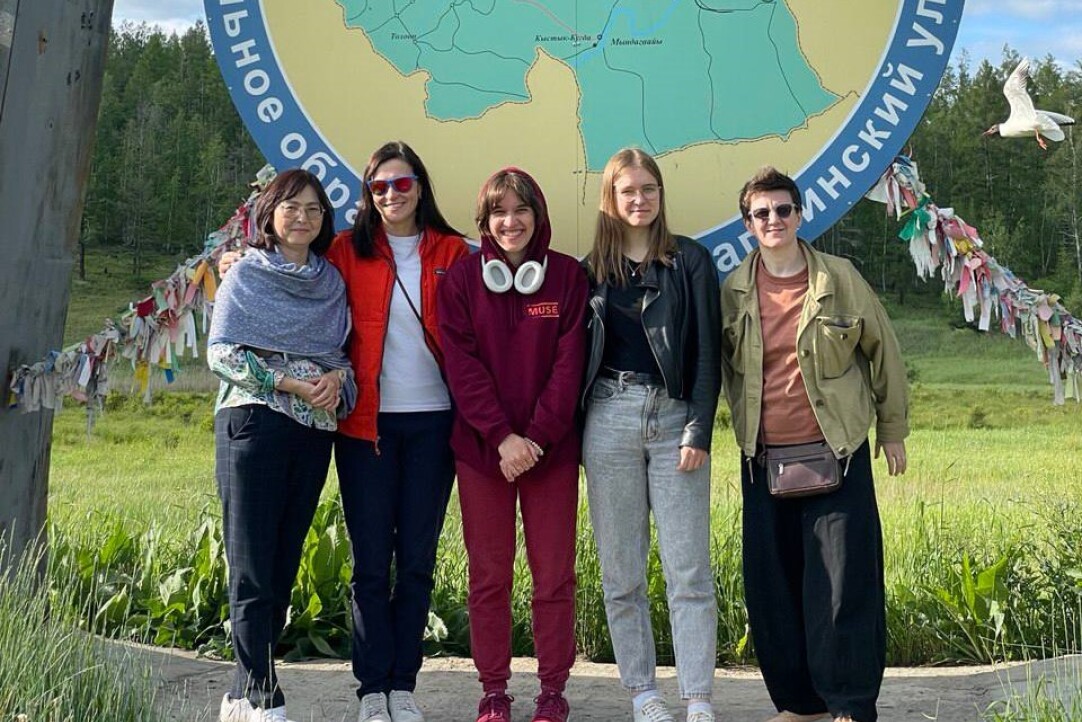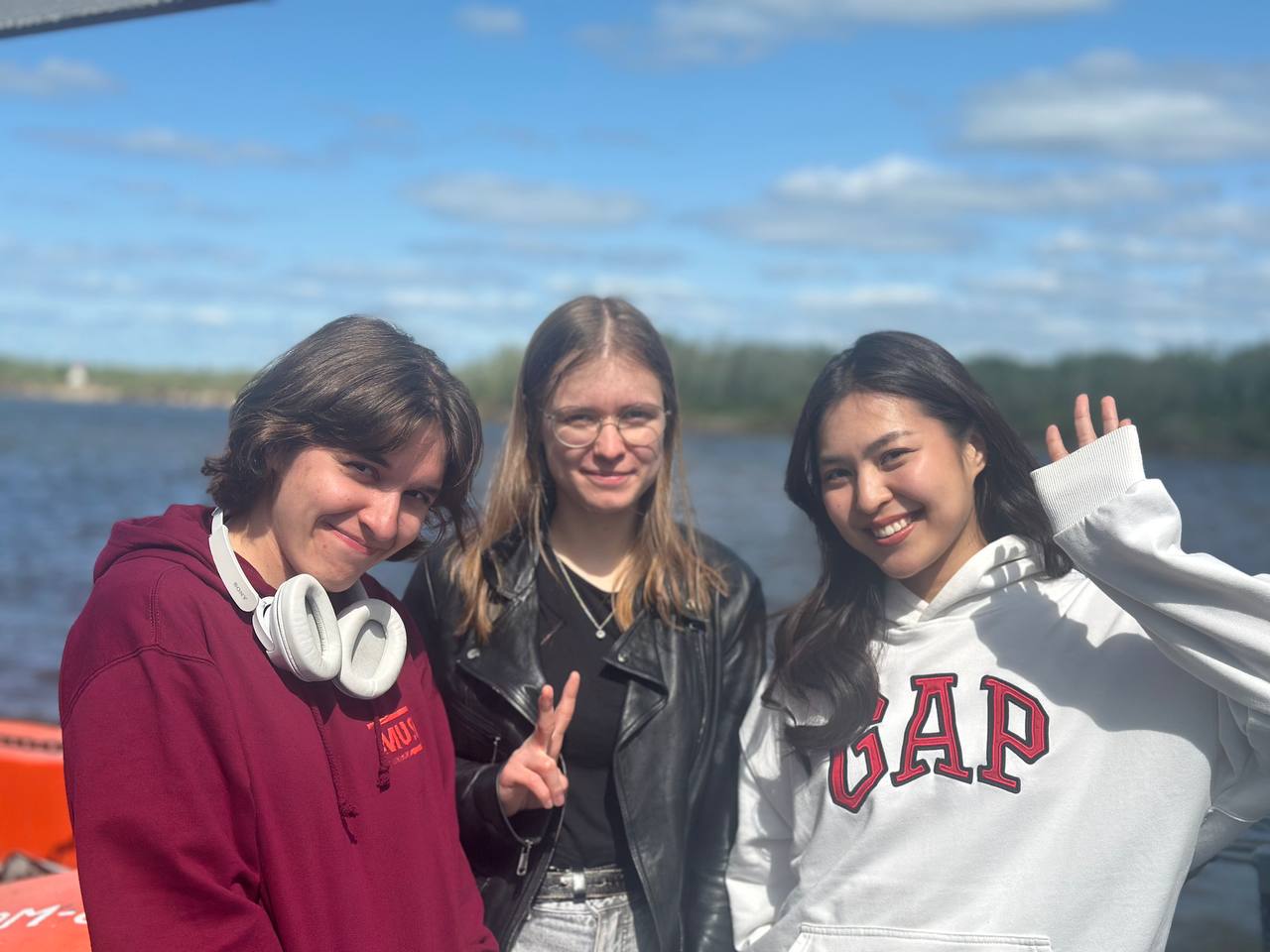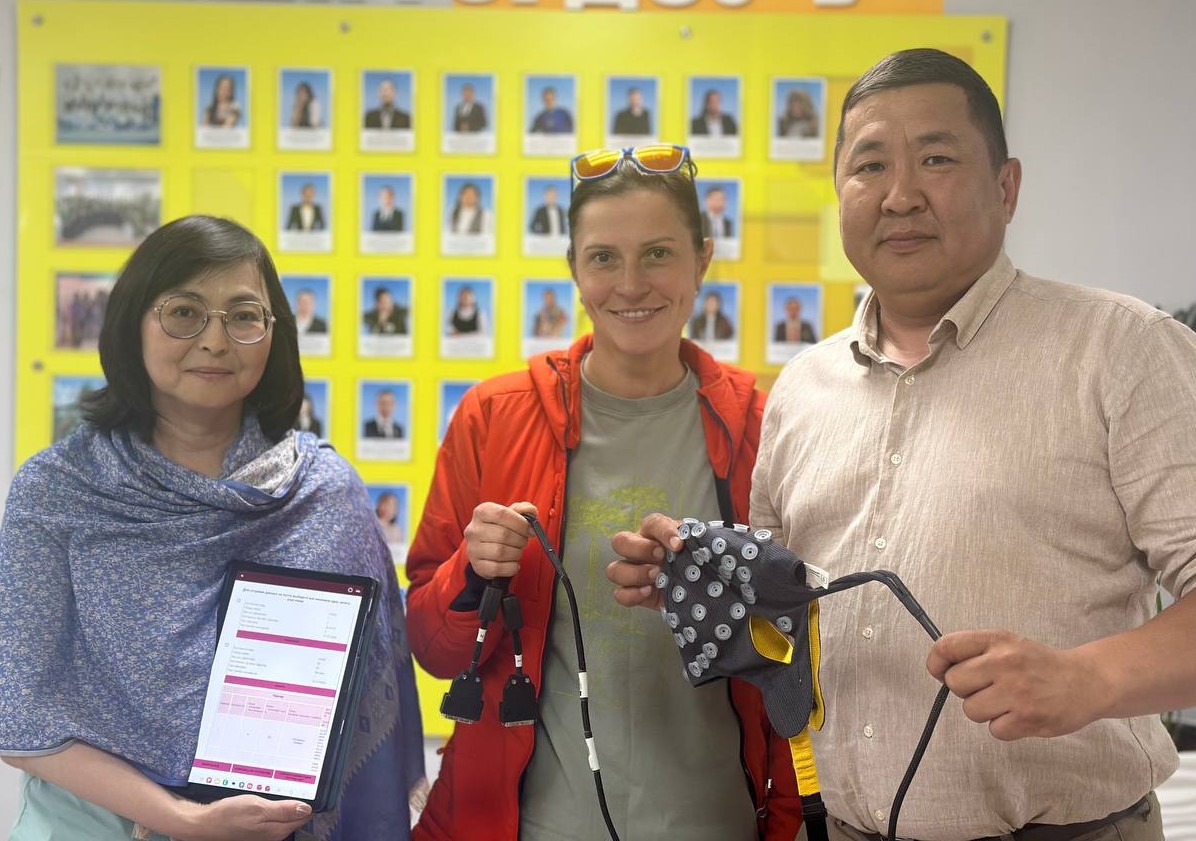Centre for Language and Brain Conducts First Neurolinguistic Field Study of Reading in Yakut

In July, a team from the HSE Centre for Language and Brain, in collaboration with the Centre for the Study, Preservation, and Development of Native Languages of the Academy of Sciences of the Republic of Sakha (Yakutia), conducted the first-ever neurolinguistic expedition to the village of Churapcha to study reading in the Yakut language using electroencephalography (EEG). For the first time, EEG data from 43 adults and behavioural data from 40 children was collected during the two-week expedition.
According to Olga Dragoy, Director of the HSE Centre for Language and Brain and head of the expedition, experimental linguistics worldwide still relies primarily on data from a small number of well-studied languages, mostly from the Indo-European family. As a result, she argues, it is methodologically unsound to draw universal conclusions about the nature of language from such a limited dataset. The objective of the Centre for Language and Brain is to expand both the geographical reach and linguistic diversity of experimental linguistics. Russia, with its multilingual population, offers unique opportunities for this, being home to languages from a wide range of families and groups.
Prior to this expedition, no psychoneurolinguistic research had ever been conducted using material from the Yakut language. The first experiment of this kind was carried out in Churapcha by a team consisting of Olga Dragoy, Olga Tuzhik, and Polina Pilipets from the Centre for Language and Brain and Nadezhda Vasilyeva from the Centre for the Study, Preservation and Development of Native Languages of the Academy of Sciences of the Republic of Sakha (Yakutia).
The choice of the village of Churapcha was intentional, as 99% of the local population speaks Yakut, making the Churapcha district a unique setting for studying native language perception in the context of active Yakut–Russian bilingualism.
During the two-week expedition, the team collected EEG data from 43 adults and behavioural data from 40 children. Adult participants were shown sentences containing incorrect tense coordination. The researchers recorded event-related brain potentials using EEG, enabling them to observe how the brain responds to different types of language errors.
‘The Yakut language distinguishes between an immediate past tense—eg, üleleetim, meaning "I have been working (recently)"—and a distant past tense, as in üleleebitim, meaning "I worked (a while ago)." We are interested in how the brains of native Yakut speakers respond to tense agreement errors between adverbs and verbs,' explains Polina Pilipets, Research Assistant at the HSE Centre for Language and Brain.
For instance, some sentences in the experiment combined the adverb bylyryyn ('a year ago,' indicating distant past) with a verb in the immediate past tense, or paired the adverb subu aghay ('just now,' indicating immediate past) with a verb in the distant past tense.

'According to preliminary surveys of native speakers, sentences that combine a distant-past adverb with a verb in the immediate past tense are perceived as more "incorrect." We expect this distinction to be reflected in the EEG signals—specifically, in the form of larger evoked potential amplitudes in response to the more prominent error,' comments Olga Tuzhik, Research Assistant at the HSE Centre for Language and Brain.
Alongside the EEG experiment, the team conducted behavioural testing with 40 bilingual children who speak both Yakut and Russian. The children completed cognitive tasks in both languages, including the RAVLT and the Trail Making Test in Russian, as well as tasks in Yakut. During the expedition, the researchers, in collaboration with linguists and native speakers, adapted the Russian-language LexiMetr test for assessing children's reading skills in Yakut and collected data in both languages.
'Adapting diagnostic tools for the Yakut language is of great importance, as it enables early diagnosis and support of children with reading difficulties. These tools are essential for both teachers and psychologists,' emphasises Nadezhda Vasilyeva, Leading Researcher at the Centre for the Study, Preservation and Development of Native Languages of the Academy of Sciences of the Republic of Sakha (Yakutia).

The expedition to Churapcha marked the first step toward a systematic study of the Yakut language using neurolinguistic methods. Moving forward, the researchers plan to examine aphasia in Russian–Yakut bilinguals. Similar studies have long been conducted in Russia with respect to the Russian language, but it remains unclear how aphasia manifests in Yakut or what specific language disorder patterns occur in native Yakut speakers. Yakutia offers all the necessary conditions for this research. In particular, the M.E. Nikolaev National Centre of Medicine is equipped with modern neurological and diagnostic facilities and has already expressed its willingness to collaborate.
'I would like to commend the excellent organisation of this expedition. It was the first time we experienced such a high level of collaboration: our colleagues from the Academy of Sciences of the Republic of Sakha (Yakutia) and the administration of the Churapcha district ensured flawless logistics, accommodation, and participant recruitment and motivation. It was truly an inspiring experience,' Olga Dragoy concluded.
See also:
Updated Facts and Figures and Dashboards Now Available on HSE Website
The HSE Office of Analytics and Data Management, together with the Visual Communications Unit, has developed a new Facts and Figures about HSE University page on the HSE website. In addition, all university staff now have access to a dashboard with the updated indicators of the Priority 2030 programme.
HSE to Entrust Routine CPD Programme Development to AI
HSE University, together with the EdTech company CDO Global, is launching AI-based constructors to streamline the design of continuing professional development (CPD) courses. The new service will automate the preparation of teaching materials and assessment tools, significantly reducing the time and resources required of lecturers and instructional designers.
‘Territory of the Future. Moscow 2030’ Forum-Festival to Feature Innovative Projects from HSE Graduates
Until September 14, 2025, the Russian capital is hosting a large-scale forum-festival called ‘Territory of the Future: Moscow 2030’ —a space for technology, science, and innovation. This event showcases cutting-edge developments in medicine, astronautics, and the digital economy. HSE Art and Design School is participating in the festival with two graduate projects in Product and Industrial Design.
‘The Goal of Modern Geography Is To Digitise Expert Knowledge and Integrate It with Big Data’
The importance of geographical science is increasing, as is the demand for education in this field. Since 2020, application numbers for Bachelor’s programmes at HSE University’s Faculty of Geography and Geoinformation Technology have climbed by 30%, while interest in Master’s programmes has also expanded, with applications up 10–15%. Nikolay Kurichev, Dean of the Faculty, spoke about this at a press conference hosted by MIA Rossiya Segodnya.
HSE Shares Its Experience of Urban Strategies at International Summer School in China
In the context of intensifying global geopolitical and technological competition, leading Chinese educational institutions—Zhejiang International Studies University and Peking University—organised an International Summer School. Their joint programme focused on studying global, regional, and urban development strategies. The HSE Faculty of Urban and Regional Development took part in this event.
Scientists Develop Effective Microlasers as Small as a Speck of Dust
Researchers at HSE University–St Petersburg have discovered a way to create effective microlasers with diameters as small as 5 to 8 micrometres. They operate at room temperature, require no cooling, and can be integrated into microchips. The scientists relied on the whispering gallery effect to trap light and used buffer layers to reduce energy leakage and stress. This approach holds promise for integrating lasers into microchips, sensors, and quantum technologies. The study has been published in Technical Physics Letters.
‘Our Result Was Recognised Not Only Within the Project Defence but Also on International Scale’
This year, the European AI Conference (ECAI 2025) accepted an article titled ‘Multi-Agent Path Finding for Large Agents is Intractable’ by Artem Agafonov, a second-year student of the Applied Mathematics and Information Science Bachelor’s programme at HSE University’s Faculty of Computer Science. The work was co-authored by Konstantin Yakovlev, Head of the Joint Department with Intelligent Technologies of System Analysis and Management at the Federal Research Centre ‘Informatics and Management’ of the RAS and Associate Professor at the Faculty of Applied Sciences. In the interview, Artem Agafonov explained how he came up with the idea for the article and how he was able to present it at an A-level conference.
HSE Scientists Test New Method to Investigate Mechanisms of New Word Acquisition
Researchers at the HSE Centre for Language and Brain were among the first to use transcranial alternating current stimulation to investigate whether it can influence the acquisition of new words. Although the authors of the experiment have not yet found a link between brain stimulation and word acquisition, they believe that adjusting the stimulation parameters may yield different results in the future. The study has been published in Language, Cognition and Neuroscience.
Twenty vs Ten: HSE Researcher Examines Origins of Numeral System in Lezgic Languages
It is commonly believed that the Lezgic languages spoken in Dagestan and Azerbaijan originally used a vigesimal numeral system, with the decimal system emerging later. However, a recent analysis of numerals in various dialects, conducted by linguist Maksim Melenchenko from HSE University, suggests that the opposite may be true: the decimal system was used originally, with the vigesimal system developing later. The study has been published in Folia Linguistica.
HSE University–St Petersburg and Universiti Teknologi Malaysia Release First Book of Mirror Laboratory
Malaysia hosted the AHIBS 'Weaving Horizons for Sustainable Impact' international conference, which featured the presentation of the first Russian–Malaysian book of research articles.


